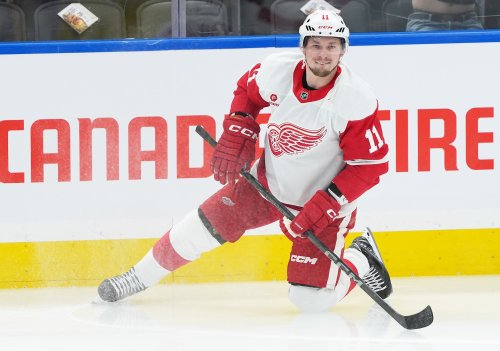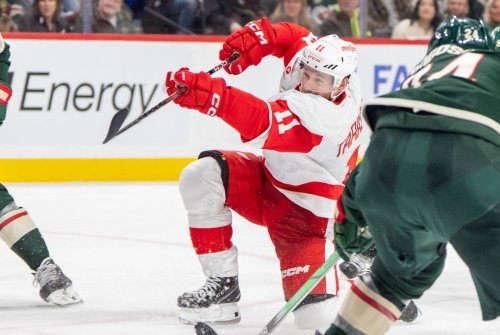
We’re back. With the Iowa Wild starting their season, there’s been morning skates, a scrimmage, and a multitude of pre-season interviews that have kept me from this side project.
If you don’t know what I’m talking about, I’ve been working through Rob Vollman and friends’ 2017 edition of the Hockey Abstract which has given the Wild praise as “a strong candidate for a home playoff seed”.
In examining Vollman’s thirteen criteria for evaluating NHL teams, the Wild have only broken the top 10 in their metrics once by virtue of Devan Dubnyk anchoring their goaltender battery. Other than that 7th spot, Minnesota has remained, relatively speaking, mediocre:
There are several categories that remain subjective in terms of statistical data presented in the Abstract with regard to how lines are made up and what kind of depth is presented.
However, there are sites that I can use to check out line productivity, namely with the help of Jason Arbuthnot’s Frozen Pool on Dobber Hockey.
The Shutdown Line
As was with the scoring line, there is no quantitative data for assessment in the Abstract when looking at the shutdown line. What Minnesota does have are two forwards that “finn-ished” with Selke votes last season (love that low hanging fruit).
Mikko Koivu was a finalist and 3rd in voting with a shade over 45% of the vote (752 ballots). Although the Selke is usually won by a center (the last winger to win it was Jere Lehtinen in 2002-03), Mikael Granlund garnered 2% of the vote (33 ballots) while playing the wing for Koivu on his way to a career best, 69 points (nice).
In the Abstract’s view, “Koivu was a Selke finalist, and Granlund could be next”.
So what do you look at when there isn’t a set list like there was for the first five metrics? Vollman points to his own “player usage charts” and the ever popular Micah Blake McCurdy’s “score state deployment charts.
You’ll notice that Granlund and Koivu took the majority of the defensive zone starts the last two seasons along with late 2017 acquisitions of White and Hanzal. Zucker also sneaks his way into the defensive forward role as well.
This would make sense as the Zucker-Koivu-Granlund line accounted for around 71% of Granlund and Koivu’s 5-v-5 ice time and over 85% of Zucker’s. You already know Zucker is in more of a defensive role as he isn’t a prominent member on the PP.
What we also know about is the discipline of this line. The unit accounted for a little more than 11% of the Minnesota’s total PIMs. Granlund had an outstanding season, getting just 12 PIMs (-56% below league average), while Koivu (+18% above league average) and Zucker (-26% below league average) each had less than 35 minutes (per McCurdy).
It’s not just about keeping a player out of the box, but also generating opportunities for the man advantage. Compared to the league average (per McCurdy), Zucker drew 98% more penalties, Granlund drew 21%, and Koivu was the “weak link” of the line by by drawing -43%. Although Zucker wasn’t contributing too often on the PP, he’s definitely an asset in getting the other guys in the position to do so. Both Koivu and Granlund had 20 power play points last season (7G/13A; 2G/18A).
What is also important is separating opposing offenses from pucks and keeping shooters in check. In keeping that Zucker-Koivu-Granlund line, the unit has a whole blocked 157 shots (65/50/42) and combined for 155 hits (32/50/73).
In returning to McCurdy’s “player isolate” charts, it appears that the majority of shots come from the right-side of the defensive zone. This isn’t to say that Granlund is a liability, but in looking at these charts, Zucker is the only one that appears to suppress the left-side part of the defensive zone well (hint: red is bad, blue is good).
Now, I realize that the NHL doesn’t divide the ice evenly into thirds like we’re playing shinny out there, but it bears suggesting that Minnesota’s “shutdown” line does have a weakness if teams roll out a shot generating, offensive-defenseman on their left side (right side for Minnesota in the defensive zone) à la Duncan Keith or Roman Josi in the Central Division.
Forward Depth
This is where the Abstract continues to lose me in their overall evaluation of Minnesota’s playoff hopes. It is also the first metric that doesn’t appear "passable" by their standards where “[the Wild] have a very strong third line, but not much after that.”
So who is going to appear on that third line? Fourth line?
Over the course of the pre-season we’ve been without Zach Parise (reportedly set to practice this week) and most recently seen the top two lines of Zucker-Koivu-Granlund and Nino-Staal-Coyle producing (though not against Dallas’ top players in their most recent 5-1 win). Luke Kunin got sent down to Iowa this week, so it appears that we won’t be seeing him at the wing to start the year (thanks to the cap).
With the addition of Daniel Winnik trading in his PTO for a one-year, $660,000 contract, that leaves the Wild’s cap ceiling with $206,409 of breathing room. With the questions swirling around Parise’s back health, this will most likely be the cushion for when injuries occur and Minnesota will be able to bring up guys like Kunin ($925,000 AAV) and the like.
The only good news in that the Vanek buyout is only on the books for one more season.
Winnik played with Washington last season, but under a contract inked with the Toronto Maple Leafs. His AAV last season? $2.25 million. With the Wild signing an NHL veteran of over 700 games to peanuts, the picture becomes a bit clearer.
What we can do now is plug and chug.
Joel Eriksson Ek is expected to be the third line center as a rookie, and Matt Cullen will be holding down the fourth line at age 40. Cullen was signed after the Abstract came out, and brings a résumé of three Stanley Cups almost 700 career points. He also had a PDO of over 100 while taking over 64% of his starts in the defensive zone. A solid, veteran guy.
I think that the fourth line has their leader, but don’t expect him to bang around with the young guys who are grinding it out to climb their respective depth charts.
The biggest questions come on the wings. Ennis and Stewart are listed by several sites as interchangeable on the wings. Only Foligno is listed as purely a left-winger, so that allows for a little creativity, but not much. The three combined for 57 points last season.
With Winnik signing for a contract valued at less than that of the average ELC, the third and fourth lines could look like this:
Ennis-JEE-Winnik
Foligno-Cullen-Stewart
You could even suggest the third line is in trouble, especially if we see the Tyler Ennis that hasn’t played a full season of hockey since 2014-15. If he goes down, even if he goes on LTIR, there is little room to bring up a replacement from the AHL like Kunin or even a Kloos ($792,500 AAV) given the current cap situation.
Parise is already set to sit out the first two games of the season. Even when he gets back, we might be looking at an ineffective winger playing hurt and the possibility to Nino being the guy running the show on the third line.
That fourth line looks aggressive, and Cullen adds a lot to it despite his age. Statistically speaking, it looks like that Minnesota is going to lean heavily on the fourth line being defensive stalwarts, evened out by their top two scoring lines.
The diagnosis of depth for the Abstract rings with a half-truth. That third line appears shaky, but serviceable, even with the experience of Winnik who has over 100 more career PIMs than points. Minnesota could be in a lot of trouble when the injury bug bites.
And it already appears to be burrowing in.
Next, I’ll be looking strictly at the defense: Top Pairing, Second Pairing, and Defensive Depth.
Think you could write a story like this? Hockey Wilderness wants you to develop your voice, find an audience, and we'll pay you to do it. Just fill out this form.








Recommended Comments
There are no comments to display.
Join the conversation
You can post now and register later. If you have an account, sign in now to post with your account.
Note: Your post will require moderator approval before it will be visible.